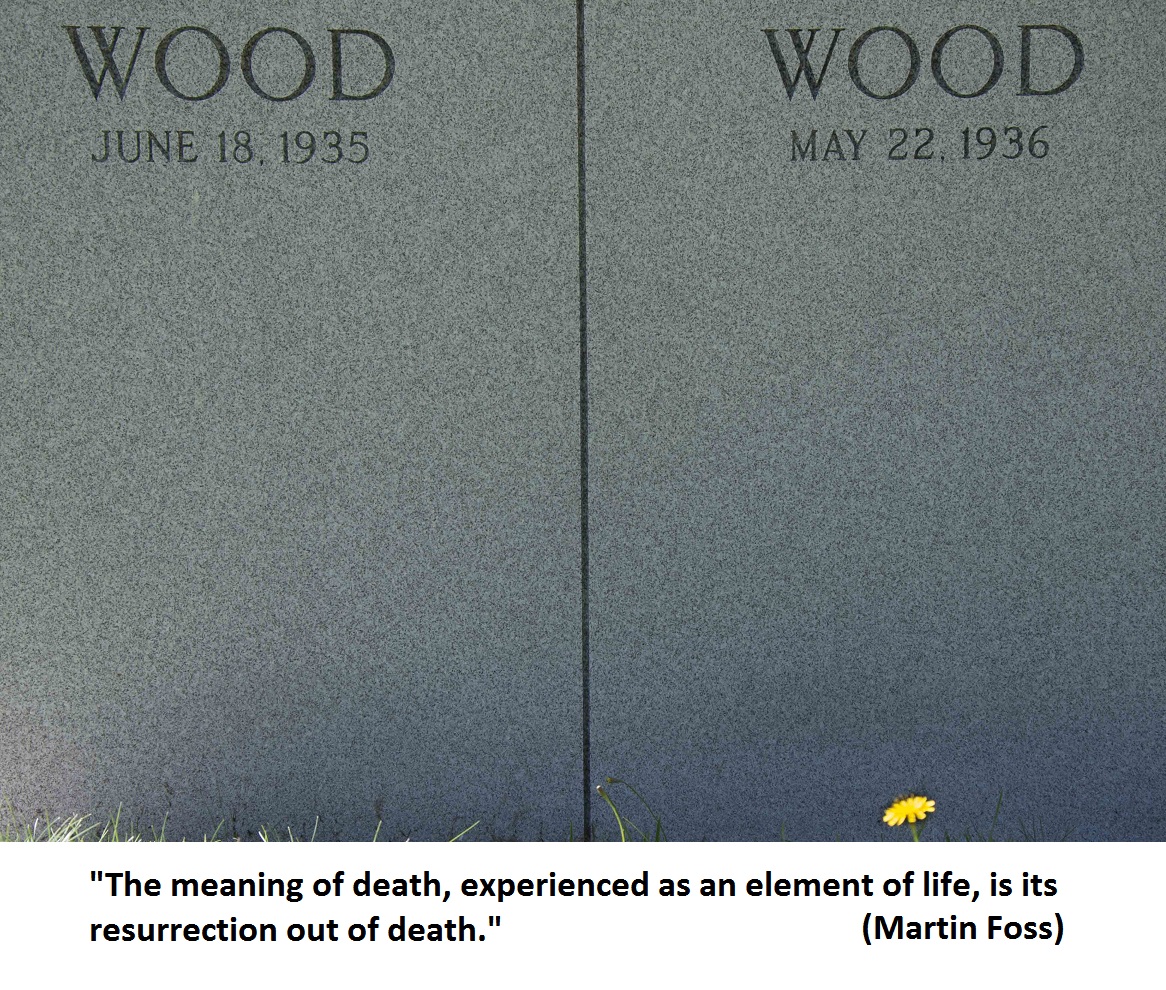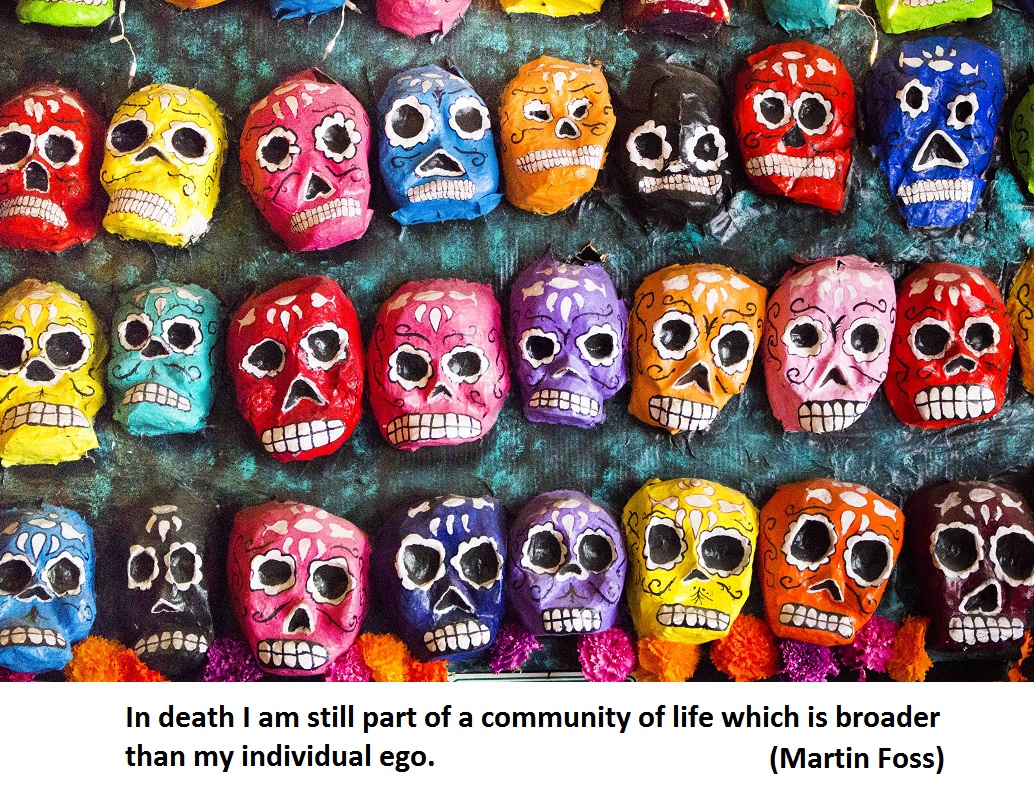|
Death as a sacrifice for a higher life
Martin Foss (1889-1968) was a German-born philosopher who is now often neglected. He was born in Berlin, and studied philosophy and law in Europe. Being Jewish, he left Germany after the rise of Hitler to power, and for four years traveled secretly between Paris and Berlin, working against the Nazis. He then moved with his family to the USA, with the help of the Quaker community, and taught philosophy at Harvard College and Temple University. He died of a heart attack at the age of 79.
The following text is adapted (and simplified in several places) from Foss’s book Death, Sacrifice, and Tragedy. Foss explains here that death is not an end. My death is part of the movement of my life towards a higher level of existence. And this movement does not end when I die, because my life is part of a larger movement.
To understand the text, it is important to see that Foss gives a special meaning to some concepts: SACRIFICE doesn’t mean simply risking myself. When I sacrifice, something dies in me for the sake of a higher level of life. In this sense, life is a constant sacrifice, because life is the movement towards a higher level.
 My sacrifice is my response to my destiny. But DESTINY does not mean a fate that is imposed on me from heaven. It means, rather, a call which I receive from a higher life – a call which I am free to follow (or not to follow) in my own way. My sacrifice is my response to my destiny. But DESTINY does not mean a fate that is imposed on me from heaven. It means, rather, a call which I receive from a higher life – a call which I am free to follow (or not to follow) in my own way.
This HIGHER LIFE (or higher sphere or meaning) is not a “thing” – it is not God, or heaven, or any fixed object. Rather, it is the horizons of life that are broader than my small ego. It includes me but also other people, and life in general. One might call it human reality, or Life, or the community of human beings.
My death, therefore, is part of a larger sacrificial movement in which I respond to a higher level of life and sacrifice myself to it.
From CHAPTER 6
No development occurs without the sorrow which accompanies the necessity to destroy in order to develop. The child in us, with his charm and innocence, is destroyed in order that the adolescent may appear. The adolescent, with his vivacity and daring, must be sacrificed in order that the adult may be born.
From CHAPTER 7
Sacrifice, even if it is death, is not an end but a transition to a new beginning. It is an offering which by passing away is somehow preserved because it integrates and intensifies the reality it was given to. In the sacrificial act, what is seemingly destroyed continues living. It is therefore not only preserved, but – more than that – it is elevated and it plays a role in a higher sphere of meaning. This is a destruction which turns into creation.
[…]
The death of the beloved, understood as his sublime offering and sacrifice in the communion and for it, will keep the communion between the survivor and the deceased. It will intensify the living experience of this communion, in which the deceased continues living. The death will not impoverish the survivor but will enrich him and send him on his way with greater courage. He will feel strengthened in the permanent presence of the sacrifice, which has always been the essence of the loving communion but which has now received its ultimate seal through the final and total offering.
[…]
It cannot be repeated too often that sacrifice is the conversion from loss into gain. It is not an end but a beginning. […] The meaning of death, experienced as an element of life, is its resurrection out of death.
From CHAPTER 9
 Life is essentially a continuous conversion from a lower sphere to a higher one, destroying the lower for the sake of realizing the higher. Therefore, this creative destruction, this sacrificial action, gives to life its essential character, which is sacramental. It can be called “tragic.” Life in its maturity is a tragic drama because it cannot be lived without the continuous destruction of what is dear to us. Whether the object of destruction and sacrifice is bodily or mental, our past memories and achievements, it is always a part of ourselves which we must sacrifice. It is always self-sacrifice, and therefore it is accompanied by sorrow and suffering. Life is essentially a continuous conversion from a lower sphere to a higher one, destroying the lower for the sake of realizing the higher. Therefore, this creative destruction, this sacrificial action, gives to life its essential character, which is sacramental. It can be called “tragic.” Life in its maturity is a tragic drama because it cannot be lived without the continuous destruction of what is dear to us. Whether the object of destruction and sacrifice is bodily or mental, our past memories and achievements, it is always a part of ourselves which we must sacrifice. It is always self-sacrifice, and therefore it is accompanied by sorrow and suffering.
[…]
If we try to name the mysterious domain which calls us to sacrifice – this destiny, then we should be aware that any name will be inadequate. We may speak of the “community of lives” of which the person is a member. […] Such a communion of total and unlimited sharing is a communion of love or friendship, absolute and unique, not influenced by the ups and downs of everyday life, holier than any single life but giving dignity to the life which serves in it, responsible for the wider life of the communion. Thus, the call of destiny comes from an extended reality, a wider self than the individual self, but a reality to which the individual belongs as a member.
[…]
Sacrifice intensifies and enriches life. It is the price paid for our growing future and our growing strength. Intensification, too, goes beyond our ego, and it radiates into the life of the communion, sanctifying this wider life through the sacrificial act.
[…]
Even when death occurs, it is not the only sacrificial act, not even the ultimate one. It is rather only the final seal on the sacrificial destruction which has happened before. It leaves the person in a disturbed but intensified state of existence which is the result of a sacrifice throughout life.
|


